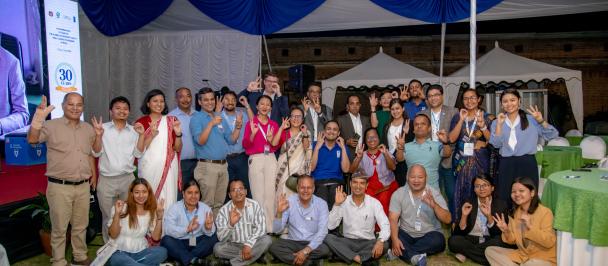
17 March, 2024 Jajarkot. Two types of polyhouses – a naturally ventilated and a nursery polyhouse with misting – were inaugurated by the Government of Japan and the United Nations Development Programme, in Ward 7 of Nalgad Municipality, Karnali Province. This area was among those affected by the earthquake in November 2023. The multi-purpose nursery with misting will grow saplings of high value crops such as vegetables, fruit, forage and fodder for community members. These polyhouses employ drip irrigation and mist irrigation which make optimum use of water, conserve water usage, decrease labour and increase agricultural productivity. The nursery will directly benefit 25 members of the farmers’ group and other local farmers in the community. The naturally ventilated polyhouse demonstrates the benefits of climate smart agriculture interventions, enabling off-seasonal high value vegetable production.
In addition to this, the first five, out of 900, metallic improved cooking stoves and 6 orchard management tools were handed over to the local farmers, who are impacted by the earthquakes, to support their livelihood. Through ‘Enhancing Human Security Through Local Climate Action’ project 48 polyhouses have been supported, which will benefit over 40 households.
Addressing the handover event, Mr. Takahiro Tamura, Deputy Chief of Mission of the Embassy of Japan said, "I expect that the agricultural and energy equipment handed over today will be used for a long time by the people in this region, and I believe that this project will contribute to strengthening human security through a comprehensive approach that includes gender equality, disability, and social inclusion.” Also expressing his condolences to all those affected by the earthquake, he elaborated, “I am heartened to hear that the capacity built through this project was very helpful during the Jajarkot earthquake response, as the trained volunteers were mobilised and helped to provide first aid, search and rescue and shelter support. Also, I am glad to know that the energy and agriculture support through this project is helping the communities to bounce back for better.” He added that the project will further strengthen the relationship between Japan and Nepal as well as the friendship between people of the two countries.
Meanwhile, Mr. Julien Chevillard, Deputy Resident Representative of UNDP, stated, 'Considering the high vulnerability, Karnali is a priority province of UNDP, and a number of projects ranging from governance to earthquake preparedness and response are being implemented based on the Leave No One Behind principle.' Thanking the Government of Japan, he added, 'Through this partnership, we contribute to Nepal's ongoing efforts to mitigate the impact of climate change, rehabilitate post-earthquake, and enhance the livelihoods of the affected community.
Thanking the Government of Japan and UNDP, Mr. Dambar Bahadhur Rawat, Mayor of Nalgad Municipality, emphasized, "Agriculture is the primary livelihood for Nalgad residents, and the provision of agricultural equipment support has assisted the affected community in sustaining their livelihoods post-earthquake. We seek further assistance in the second phase of this program, which can offer technical and financial support for recovery and livelihood restoration.”
Mr. Bir Bahadur Giri, Chair of Barekot Rural Municipality, emphasized, 'Climate change is a global concern, and here in Karnali Province, we are among the first to feel its effects. It is crucial to empower our community and raise awareness about the impacts of climate change, prompting local initiatives to mitigate these effects. We deeply appreciate the support from the Government of Japan and UNDP during these challenging times and hope for continued collaboration in the future.'
In Nepal, Karnali province is among the most remote provinces in Nepal. The Human Development Index (HDI) for Jajarkot District, in Karnali Province, stands at 0.393, falling below the national average of 0.587. Compounding these issues is the district’s vulnerability to natural hazard induced disasters, particularly floods and landslides induced by rainfall and earthquake posing additional threats to the well-being of its residents. In October 2022, Karnali Province experienced a severe flood and landslide, resulting in numerous casualties. The impact of climate change is exacerbating the already challenging situation in Jajarkot after the earthquake. Disasters and poverty are mutually reinforcing, thus creating a cycle of vulnerability and disaster.
The joint field visit reaffirms the commitment of the Embassy of Japan and UNDP to fulfilling the Climate Promise, a shared commitment to accelerate climate action and achieve the goals of the Paris Agreement. By investing in projects like this one, Japan and UNDP are working together to build climate-resilient communities and mitigate the adverse impacts of climate change.
--
The ‘Enhancing Human Security through Local Climate Action (EHSLCA)’ project, funded by the Government of Japan, aims to improve human security through local climate action. The project, from March 2023 till December 2024, includes key components on energy solutions, adaptive agriculture, infrastructure for risk reduction, instrumentation for improving early warning and capacity building. Through the project, over 40 community members were trained in search and rescue in the months of September/October 2023 in Nalgad Municipality and Barekot Rural Municipality, right before the earthquake of 3 November. These trained volunteers provided crucial support in immediate response during the earthquake. Furthermore, the project is leveraged support to the earthquake affected communities – those affected by the Western Nepal Earthquake of 3 November 2023 - through energy solutions for early recovery in Jajakot and West Rukum Districts.
--
Climate Promise supports 120 countries – including 40 least developed countries, 28 small island developing states, and 14 high emitters – to enhance their Nationally Determined Contributions under the global Paris Agreement. Delivered in collaboration with a wide variety of partners, it is the world’s largest offer of support for the enhancement of climate pledges.
Contact:
UNDP Nepal
Richa Ranjitkar
Communications Analyst
E-mail:richa.ranjitkar@undp.org Phone: 9851003534
Embassy of Japan in Nepal
Tel: 4526680
E-mail: cultural-emb@km.mofa.go.jp
http://www.np.emb-japan.go.jp
https://facebook.com/JPNInNepal/

 Locations
Locations



